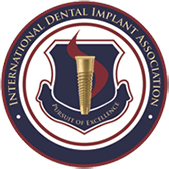Frequently Asked Questions
DENTAL IMPLANTS
A dental implant is an artificial tooth root that is placed into the area where a tooth is missing to hold a replacement tooth or bridge. Implants are made from biocompatible titanium. When placed, your body will recognize the implant and form bone around it, which helps to hold the implant in place.
Once an implant is placed, your dentist will create a crown to place on top of the implant to fully replace your missing tooth.
Almost anyone is a good candidate for a dental implant. Patients who have certain chronic diseases, are heavy smokers, or abuse alcohol may not be suitable candidates for dental implants. See your dentist to learn more about dental implants and if they are right for you.
No, age is not a factor in getting dental implants. (See “Who should get a dental implant?” for more information.)
This is a common concern. Most patients getting implants experience less pain than they would during a typical tooth extraction. Patients receive similar anesthesia as patients having other types of common dental procedures performed.
Dental implants are an affordable tooth replacement option. A three-unit crown and bridge replacement for a missing tooth will cost about $3,300 to $4,500 (2016 National Dental Advisory Service Comprehensive Fee Report). According to a study of 142 bridges in 130 patients in the British Dental Journal, median age for bridge failure was 6.2 years (Br Dent J. 1990 Mar 10;168(5):199-201.). A study in the Journal of Dentistry indicates the survival of conventional bridge abutments to be 72% at 10 years and similar to the survival time of crowns (J Dent. 2012 Nov;40(11):886-95. doi: 10.1016/j.jdent.2012.07.002. Epub 2012 Aug 3).
Fees for dental implants will vary according to your dentist and the practice location. The cost of a single implant tooth replacement will cost about $3,500 to $5,500 (2016 National Dental Advisory Service Comprehensive Fee Report). Multiple research studies from the 1990’s show single tooth implants last at least 10 years in more than 95% of patients. (Clin Oral Implants Res. 2015 Oct;26(10):1121-8. doi: 10.1111/clr.12499. Epub 2014 Nov 5).
Your dental insurance may cover costs for dental implants. Coverage for dental implants will vary according to your dental insurance provider. You should check with your dental insurance provider to learn more about what and how much of a dental implant procedure is covered under your plan.
Dental implants have many advantages. They help prevent bone resorption, which can impact the shape of your face and appearance. Implants are most like your natural teeth. They can be flossed like regular teeth and do not have the maintenance and care requirements that dental bridges or dentures have. Implants can last for decades when properly taken care of. Multiple research studies from the 1990’s show single tooth implants last at least 10 years in more than 95% of patients. (Clin Oral Implants Res. 2015 Oct;26(10):1121-8. doi:10.1111/clr.12499. Epub 2014 Nov 5).
Similar device survival rates have been shown in countless studies for full arch implant work: Bars with overdentures, teeth in a day, hybrid dentures, immediate loading of implants and fixed complete bridgework.
Payment options will vary depending on the patient’s dental insurance, practice payment offerings, and personal financial situation.
Some practices will work with patients to create personalized pre-pay plans, which allow patients to make smaller installments on a regular basis to pay for their dental implant treatment.
Other practices work with 3rd party finance companies which take over the process for both practice and patient. Care Credit (CareCredit.com), LendingClub.com – Patient Solutions, and other 3rd parties are available to provide patients with ways to help pay for dental care.
Implants can last for decades when properly taken care of. Multiple research studies from the 1990’s show single tooth implants last at least 10 years in more than 95% of patients. (Clin Oral Implants Res. 2015 Oct;26(10):1121-8. doi:10.1111/clr.12499. Epub 2014 Nov 5).
The same results have been shown in countless studies for full arch implant work: Bars with overdentures, teeth in a day, hybrid dentures, immediate loading of implants and fixed complete bridgework.
The time varies depending on the patient and their case. Dental implant placement is an outpatient procedure, and many patients can return to work within one to three days.
Factors which influence healing include: complexity of the implant procedure, location of implant, patient health issues (age of patient, smoking, chronic illnesses, etc.)
Generally speaking, the procedure itself may take 1 to 2 hours and the healing time is 3 to 6 months. Time will vary according to the patient case and needs.
Factors which influence healing include: complexity of the implant procedure, location of implant, patient health issues (age of patient, smoking, chronic illnesses, etc.)
Generally speaking, the procedure itself may take 1 to 2 hours and the healing time is 3 to 6 months. Time will vary according to the patient case and needs.
Factors which influence healing include: complexity of the implant procedure, location of implant, patient health issues (age of patient, smoking, chronic illnesses, etc.)
CAVITIES
A cavity is a bacterial infection of the tooth resulting in decay of the tooth structure. It occurs when bacteria in your mouth make acids that eat away at a tooth. If not treated, tooth decay can result in tooth pain, infection complications, and eventually tooth loss.
You can easily prevent tooth decay by brushing and flossing your teeth regularly, seeing your dentist for regular teeth cleanings and checkups, and avoiding foods that are high in sugar, acids, and carbohydrates.
Tooth decay usually does not cause symptoms until you have nerve involvement or an infected tooth. When this occurs, a toothache is the most common symptom. Many times this requires more invasive treatment, like root canals, to save your natural teeth. The difference in today’s modern dentistry is that we are able to catch cavities at an early stage, and repair the tooth with a simple white filling ($), whereas waiting until there is a toothache may require a root canal to save the tooth ($$$). Preventative care and early treatment are the best way to have a beautiful, healthy smile for life.
The combination of bacteria and food causes tooth decay. A clear, sticky substance called plaque that contains bacteria is always forming on your teeth and gums. As the bacteria feed on the sugars in the food and drinks you consume, they make acids. The acids attack the teeth for 20 minutes or more after eating. Over a period of time, these acids destroy tooth enamel resulting in tooth decay. All foods, snacks, and drinks that you consume contribute to an increase in cavities, but many do not realize how many different foods cause cavities. It’s not just candy! Sodas, sports drinks (such as Gatorade and Powerade), various sticky foods, chips, bread, and even condiments such as ketchup, contribute. Be sure to limit the amount of time your teeth are exposed to these cavity causers by brushing and flossing, or at the very least, rinsing with water.





